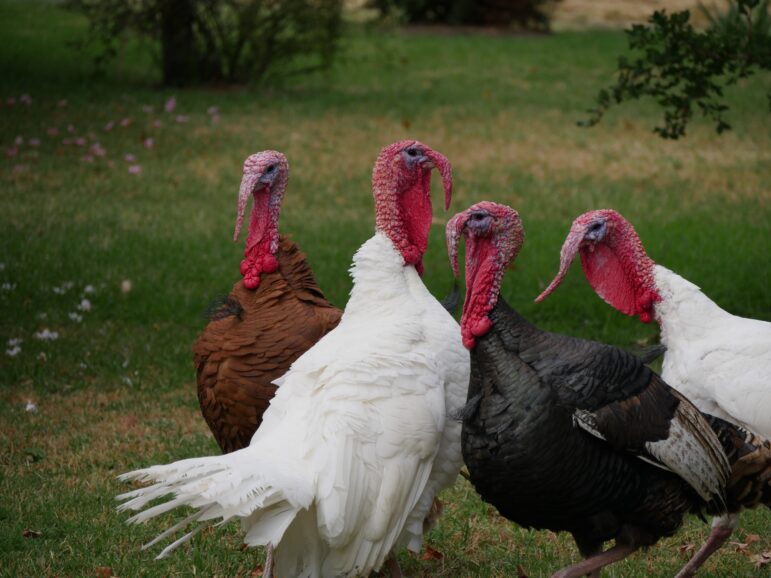
By DAN NETTER
Capital News Service
LANSING – While avian flu has disrupted poultry flocks in Michigan and spurred higher egg and chicken prices, turkeys in Michigan – wild and farmed alike – have been spared from the virulent disease, industry leaders and government officials say.
Megan Moriarty, a wildlife veterinary specialist for the Department of Natural Resources, said the agency conducted surveillance for avian flu last spring and fall, finding the virus primarily in swan, geese, ducks, vultures and eagles and, on a lesser scale, hawks and falcons.
Moriarty said no cases of avian flu among wild turkeys were found.
Turkeys are at less risk of infection than many other bird species because of a handful of factors, Moriarty said.
Wild turkeys are not scavengers, so they don’t get sick from eating infected animals. They also don’t travel together in colonies, meaning mass transmission of avian flu is unlikely, she said.
Avian flu, according to the Department of Agriculture and Rural Development, has been found in domestic backyard flocks of poultry in 15 counties in the state.
No cases have been reported so far in 2023, according to the department’s communications director, Jennifer Holton.
Nancy Barr, the executive director of the Michigan Allied Poultry Industries, said avian flu has been spotted in one commercial flock of turkeys since the start of 2022, but turkey farmers have prevented its spread to other flocks since.
Barr said since that initial case in 2022, turkey farmers have implemented biosecurity measures like perimeter buffer areas that control which people and vehicles can enter a farm.
“They draw an imaginary line around the outside of the farm and they have certain restrictions for any vehicles or people that come across that line to make sure that they aren’t potentially bringing anything from the outside,” Barr said.
A more important biosecurity measure is the line of separation at a barn door, according to Barr.
That means only farmworkers can enter barns where turkeys are housed, she said. Those workers have had no contact with other poultry and change clothes and sometimes shower before going in.
“That’s probably one of the most primary things they do,” Barr said. “Equipment is cleaned or designated just for that house. So it’s thinking about every single thing that comes into that house to keep those birds healthy.”
Barr said that turkey farmers are nervous about the upcoming northward migration of other birds from the South this spring.
According to the Occupational Health and Safety Administration, symptoms of avian flu in birds include sneezing, coughing, diarrhea, nasal discharge, swelling in body parts, loss of energy and appetite, discoloration and sudden death.
According to the U.S. Department of Agriculture, in 2021, Michigan ranked 10th in the nation for numbers of turkeys raised, with 5.1 million annually.
Ottawa and Allegan counties are the only two counties with more farmed turkeys than human residents, according to the USDA. Ottawa County produces 70% of Michigan’s commercially raised turkeys.
Ottawa County Emergency Management Director Louis Hunt, who handles avian flu matters, said the county takes the disease seriously because of the threat posed to turkey producers in the area.
He said when he has visited farms that have turkeys and other poultry, the precautions taken by the producers were “impressive.”
“First of all, you’re met with all the signs that these are biosecure facilities, and I guess that sounds intimidating,” Hunt said about his farm visits. “They have taken great pains to keep separated any potential vectors” of the disease.
On his visits, Hunt had to certify that he had no contact with any poultry in “multiple” days. He also had to be decontaminated and change his clothes.
He said owners of backyard flocks in Ottawa County have received information about what to watch out for and were ordered to immediately report any infection.
As for the upcoming migratory season, Moriarty said the DNR is preparing for a resurgence of cases in the spring and flu for wild birds, based on last year’s experience.
“Migration and large-scale movements of different bird species, it’s kind of a perfect scenario to have the virus be mixing and moving across the landscape,” he said.
Barr said Michigan is in the “Mississippi flyway,” a major bird migration route, producers will be watching their flocks diligently to ensure as little infection as possible.Most producers will assume the migrating birds are potentially infected.